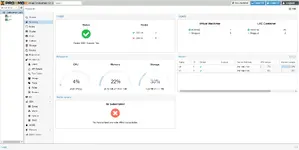Proxmox Virtual Engine (VE) is an open-source virtualization platform built on top of the Debian GNU/Linux distribution. It allows you to easily deploy and manage virtual machines (VMs), containers, and storage. Proxmox VE is a free and powerful alternative to commercial virtualization platforms like VMware ESXi and Microsoft Hyper-V.
Key Features of Proxmox VE
Key Features of Proxmox VE
- Virtualization: Proxmox VE supports a variety of operating systems as guests, including Linux, Windows, and macOS. You can easily create, clone, and migrate VMs.
- Containers: Proxmox VE also supports containerization with LXC and Docker. This allows you to run multiple isolated applications on a single host.
- Storage: Proxmox VE includes a built-in software-defined storage (SDS) solution called Ceph. Ceph provides high availability, scalability, and reliability for your storage needs.
- Web Interface: Proxmox VE comes with a user-friendly web interface that allows you to easily manage your VMs, containers, and storage.
- Security: Proxmox VE includes a number of security features, such as role-based access control (RBAC) and two-factor authentication (2FA).
- Free and Open-Source: Proxmox VE is free to use and distribute, which makes it a great option for individuals and businesses with limited budgets.
- Powerful and Versatile: Proxmox VE offers a wide range of features that can meet the needs of both small and large organizations.
- Easy to Use: The web interface makes it easy to manage your VMs, containers, and storage, even if you don't have a lot of experience with virtualization.
- Secure: Proxmox VE includes a number of security features that can help you keep your data safe.
- Proxmox VE Website: https://www.proxmox.com/en/
- Proxmox VE Documentation: https://pve.proxmox.com/pve-docs/
- Proxmox VE Forum: https://forum.proxmox.com/
